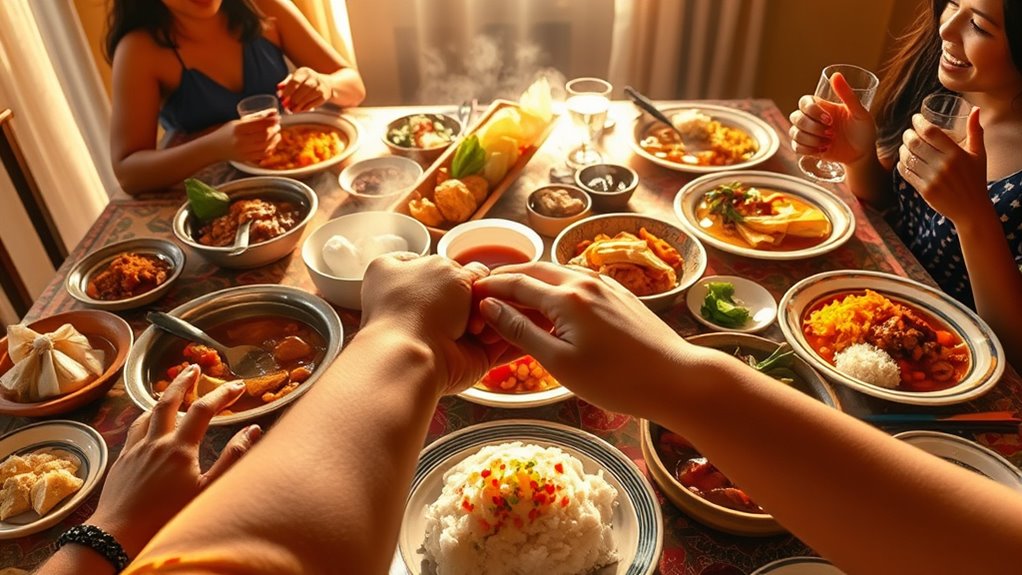Food plays an essential role in Filipino dating and bonding. Sharing meals creates connections, as traditional dishes like lumpia and lechon remind everyone of shared experiences and love. When you cook for someone, it expresses care and dedication. Plus, sitting together over a meal fosters conversation and emotional intimacy. These culinary moments strengthen relationships and build memories. If you keep exploring, you’ll discover even more about how food deepens connections in Filipino culture.
Key Takeaways
- Sharing traditional dishes like Pancit or Adobo during dates strengthens emotional bonds and showcases cultural heritage.
- Inviting a date to share a meal symbolizes genuine interest and affection, fostering deeper connections.
- Food acts as an icebreaker, encouraging conversation and laughter, making dating experiences more enjoyable.
- Cooking for someone demonstrates care and commitment, transforming meals into heartfelt gestures of love.
- Participating in food preparation together promotes teamwork and enhances relationship dynamics, fostering unity and connection.
The Cultural Significance of Food in Filipino Relationships
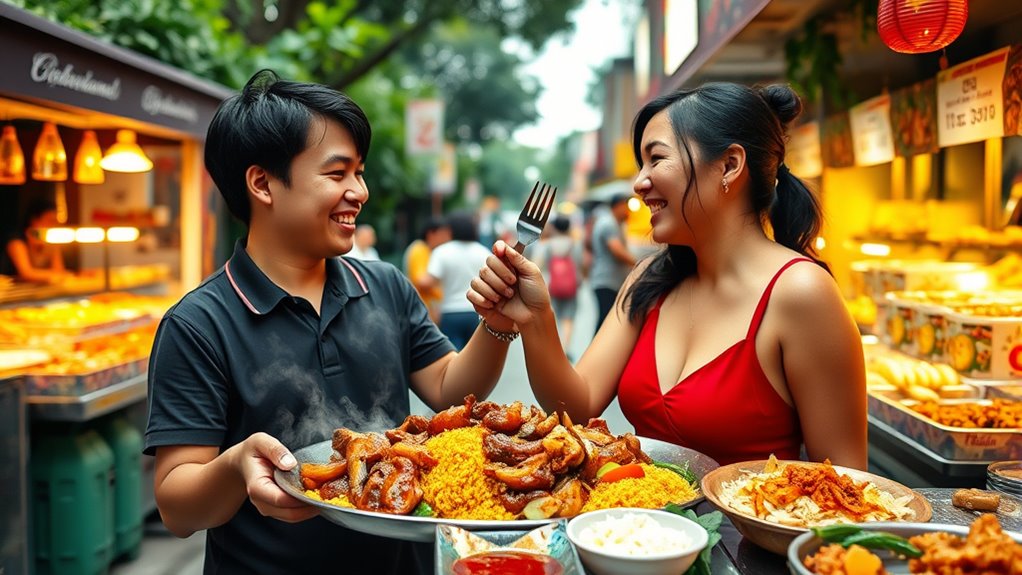
When you explore Filipino relationships, you’ll quickly notice that food plays an essential role in bringing people together. It acts as a medium for fostering connections, especially during social gatherings like fiestas and family reunions.
Filipinos display their hospitality through generous food offerings, showcasing respect and love for guests. The preparation and sharing of meals symbolize care and dedication, reinforcing social bonds within the community.
Traditional dishes often carry cultural significance, linking generations and preserving heritage. As you navigate these relationships, you’ll find that food isn’t just about sustenance; it embodies shared experiences and family values, emphasizing unity and interconnectedness in Filipino culture.
This cultural perspective enriches every social interaction you have.
Traditional Dishes That Foster Connection
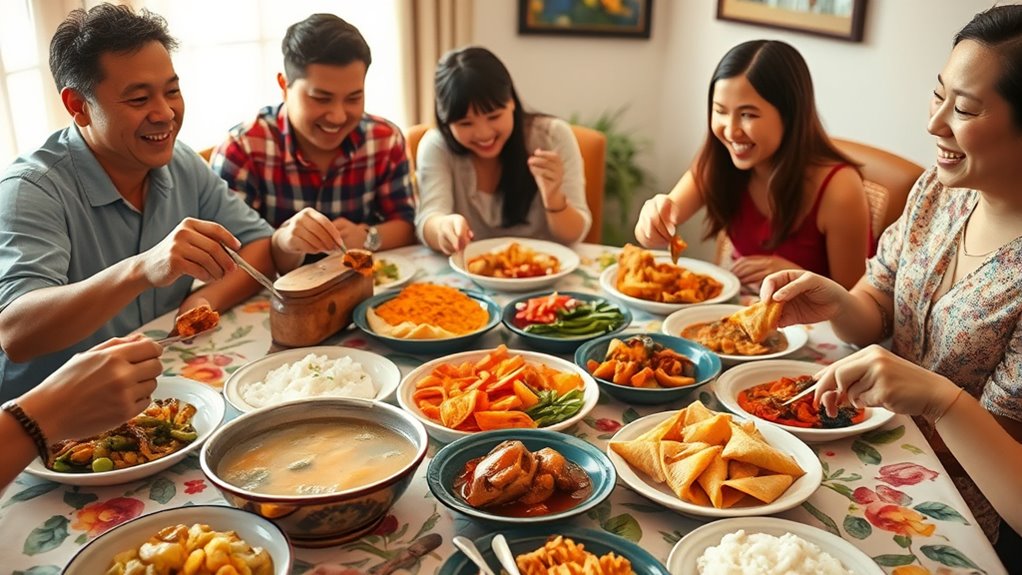
Food is at the heart of Filipino culture, with traditional dishes serving as essential connectors in relationships. When you gather with family or friends, dishes like Pancit Bihon symbolize long life, while Lechon brings everyone together in celebration, representing prosperity.
Sinigang, with its comforting sourness, evokes shared memories, fostering a sense of community. Adobo showcases the versatility of Filipino cuisine, allowing for personal touches in every recipe.
Sharing Lumpia encourages communal dining, making every meal an opportunity to bond. Whether it’s a festive fiesta or a simple family gathering, these traditional dishes not only satisfy hunger but also deepen connections, reminding you of the rich cultural heritage that unites everyone at the table.
Food as a Means of Expressing Love and Affection
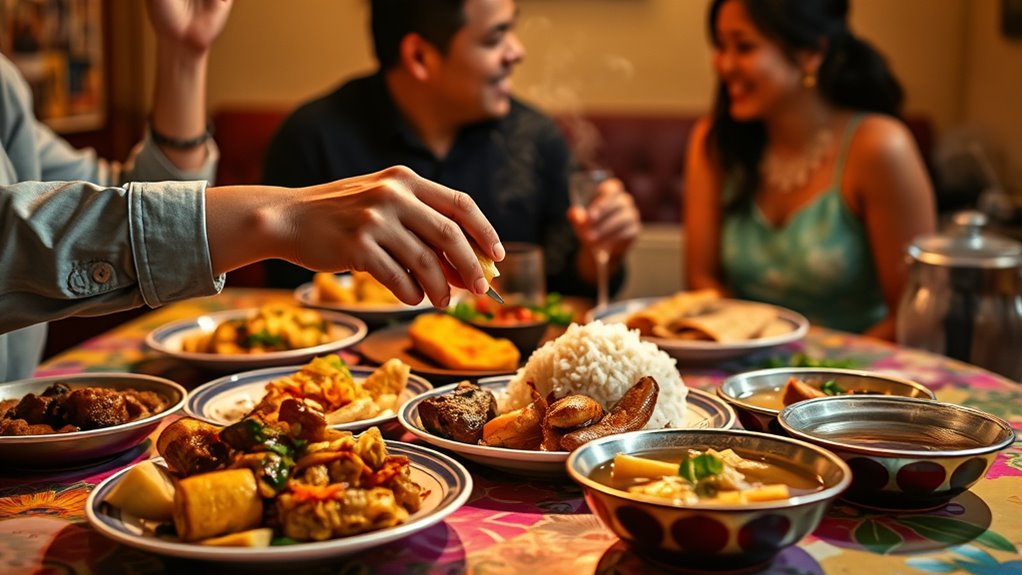
Gathering around a table filled with delicious dishes naturally fosters connection, but it’s the act of sharing food that truly expresses love and affection in Filipino culture.
When you share a meal, you’re not just enjoying flavors; you’re building emotional bonds. Cooking for someone shows your care, turning a simple dish into a heartfelt gesture.
Sharing a meal transcends taste; it weaves emotional connections, turning cooking into a heartfelt expression of care.
In Filipino gatherings, *salu-salo* emphasizes togetherness, where each shared bite strengthens relationships. Phrases like *“Tara, kain tayo”* invite others to connect over food, translating affection into action.
Celebratory dishes symbolize love and cherished memories, while the act of giving the last bite reflects true sacrifice.
Ultimately, food becomes a love language, revealing your understanding of loved ones and their preferences, deepening your connection.
Gender Roles in Food Preparation and Sharing

While traditional Filipino culture often assigns distinct roles in food preparation and sharing, these dynamics are evolving. Historically, women take charge of cooking and domestic tasks, while men focus on earning income.
However, you’ll notice a growing trend where men are becoming more involved in the kitchen, especially during family gatherings. In some regions, like Mindanao, traditional roles still hold strong, but even there, men’s participation is increasing.
In Muslim communities, it’s common to see men cooking, highlighting a cultural shift. This shared responsibility not only promotes better nutrition but also strengthens family ties.
Ultimately, as societal norms change, the kitchen is becoming a space where both men and women collaborate, reflecting a more balanced approach to food preparation.
Strengthening Bonds Through Shared Meals
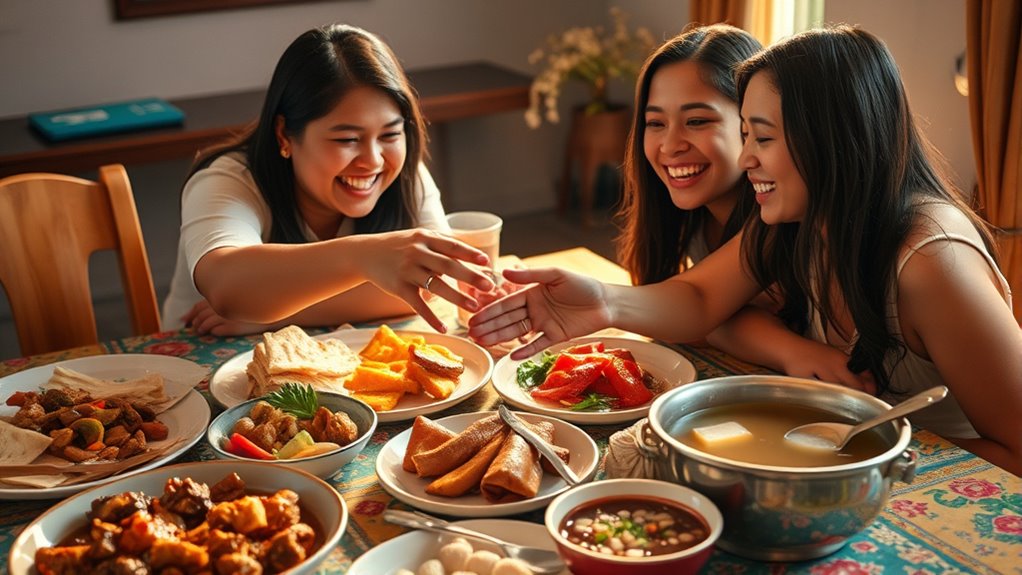
When you share a meal with someone, it becomes more than just a dining experience; it’s an opportunity to forge deeper connections and strengthen relationships.
In Filipino culture, meal sharing is a cherished norm that fosters emotional intimacy and unity. As you gather around the table, storytelling and laughter flow, creating a comfortable environment for open communication.
These shared experiences not only enhance family ties but also cultivate friendships, reinforcing a sense of community. Offering food symbolizes hospitality and respect, making every meal a gesture of camaraderie.
As you savor each bite, you’ll find that these moments contribute to trust-building, conflict resolution, and memorable interactions, ultimately enriching your relationships in profound ways.
Frequently Asked Questions
What Are Common Food-Related Date Ideas in Filipino Culture?
If you’re looking for food-related date ideas in Filipino culture, consider cooking a traditional dish together, like *Pancit* or *Beef Salpicao*.
You can also explore local eateries, sharing dishes like *Adobo* or enjoying street food adventures.
Attend food festivals to sample various treats, or host a themed dinner party showcasing your favorite Filipino meals.
Engaging in culinary classes can boost your skills while deepening your connection through shared experiences.
Enjoy the fun!
How Do Dietary Restrictions Affect Filipino Dating?
Dietary restrictions can considerably affect your dating experience. When you’re mindful of your partner’s preferences, it shows respect and thoughtfulness.
If you’re vegan or avoiding gluten, for instance, choosing restaurants that cater to those needs becomes essential. You might also have to explore creative meal options that accommodate both of your diets.
This adaptability can deepen your connection and enhance the overall experience, making your time together more enjoyable and inclusive.
Are There Specific Foods to Avoid on Dates?
Did you know that nearly 70% of first dates can hinge on the dining experience?
To guarantee a smooth evening, you should avoid bitter or sour foods that might sour the mood.
Steer clear of spicy dishes unless you’re sure your date can handle the heat.
Also, skip garlic-heavy meals to prevent awkward moments, and don’t choose excessively messy dishes that could lead to discomfort or embarrassment during your meal.
How Can Food Preferences Impact Relationship Compatibility?
Food preferences can greatly impact your relationship compatibility. When you and your partner have similar tastes, it fosters a sense of unity and shared experiences.
If you both enjoy cooking together or trying new cuisines, it can deepen your bond. However, differing preferences might lead to conflicts if not addressed.
Being open to compromise and exploring each other’s food choices can enhance your connection and understanding, ultimately strengthening your relationship over time.
What Role Does Food Play in Filipino Family Introductions?
Food in Filipino family introductions isn’t just a side dish; it’s the grand maestro orchestrating harmony and connection!
You’ll find tables overflowing with lechón, adobo, and sinigang, each bite brimming with warmth and generosity.
When you share these meals, you’re not just eating; you’re weaving memories and strengthening bonds.
Every dish tells a story, inviting everyone to join in the celebration of family, respect, and love.
It’s a feast for the heart!
Conclusion
In Filipino culture, food isn’t just sustenance; it’s the heart of connection, much like a warm embrace after a long day. As you share traditional dishes, you’re weaving stories and memories, creating a tapestry of love and friendship. By gathering around the table, you’re not just enjoying a meal; you’re nurturing bonds that remind you of family gatherings under a starlit sky. So, next time you dine, remember: every bite is a step closer to one another.
